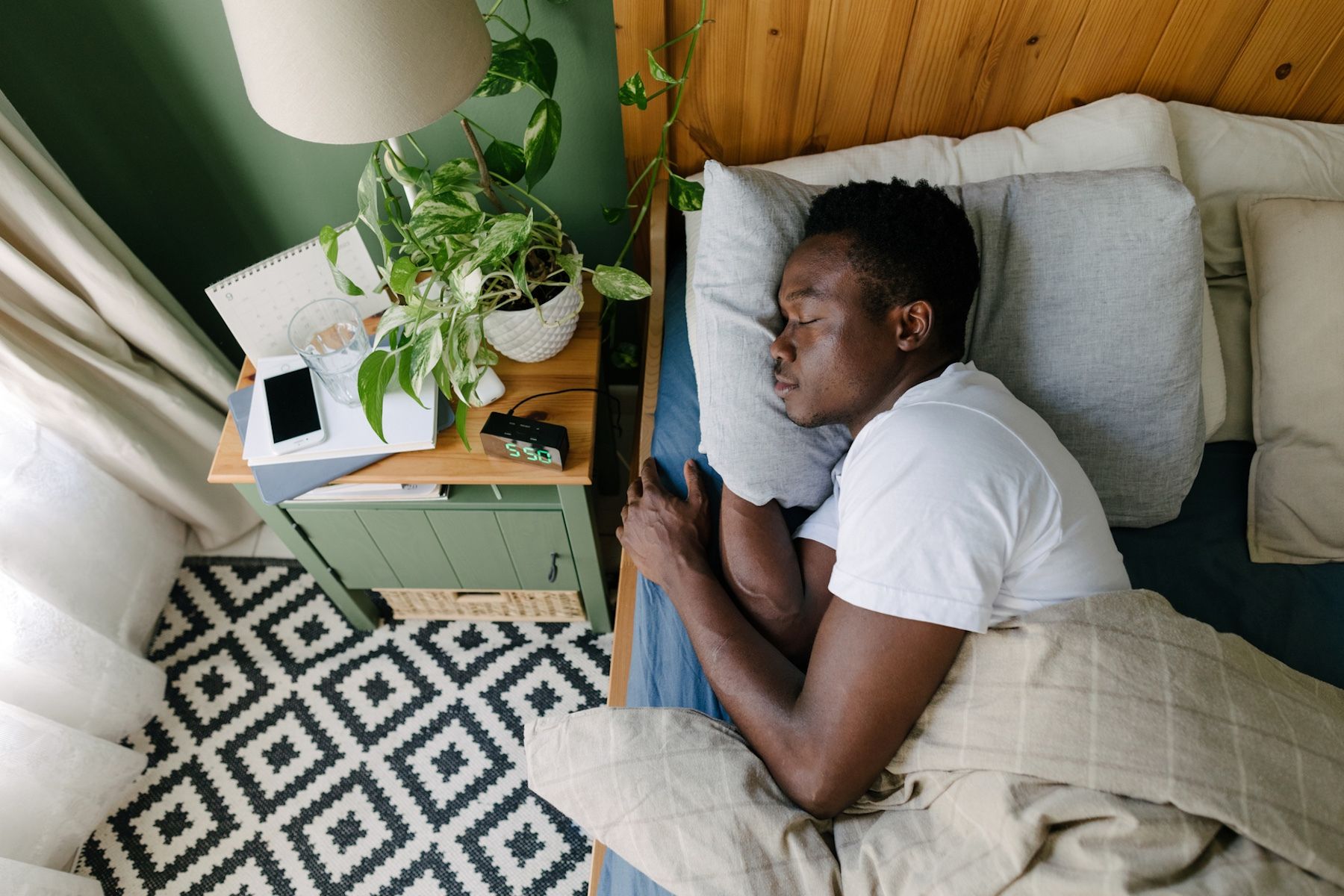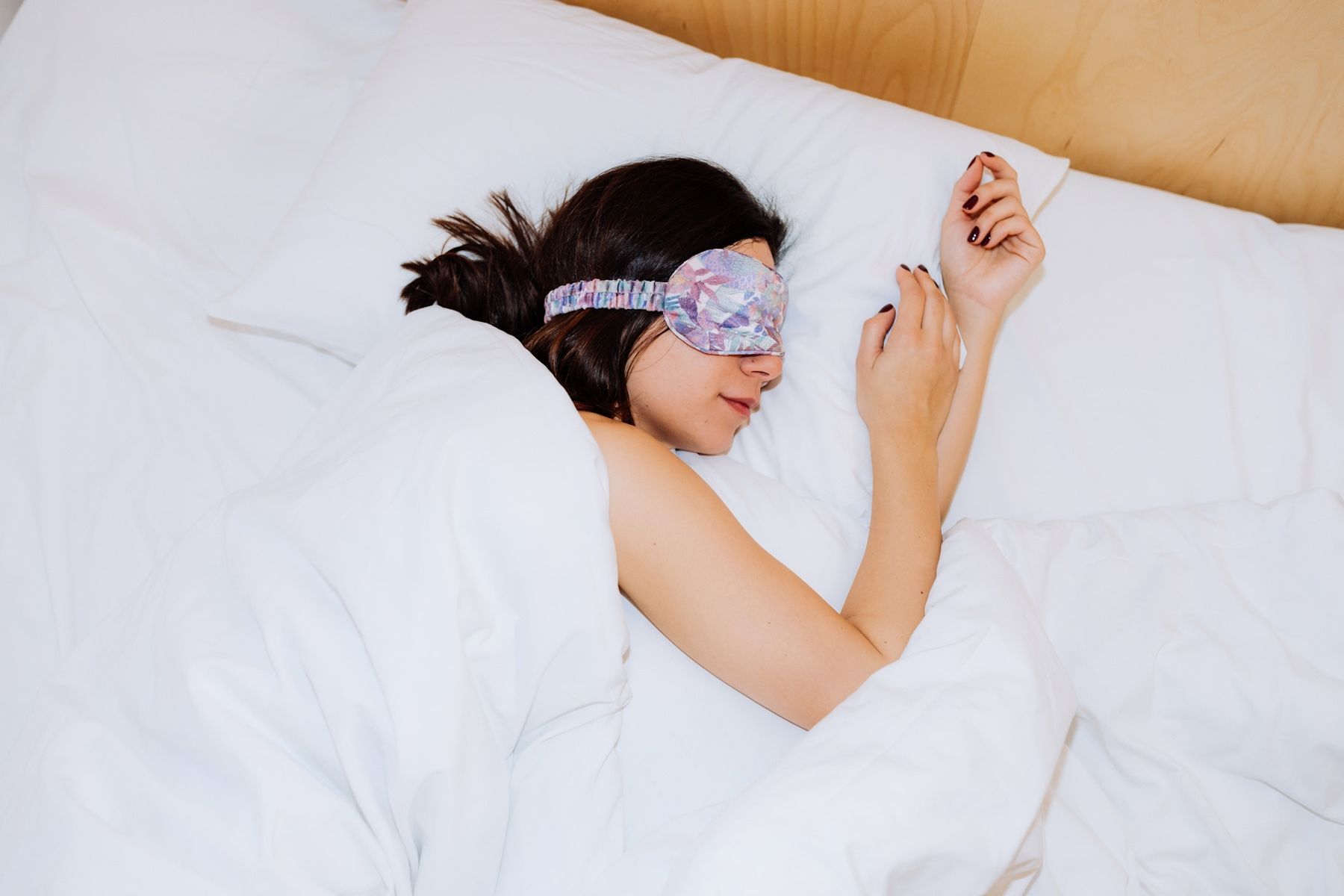
© Tanya Yatsenko / Stocksy United
What Is Sleep Hygiene? (And How to Make Yours the Best It’s Ever Been)
Your habits and environment before you go to sleep can have a big impact on the quality of your rest.
By Kipp Jarecke-Cheng•
The Importance of Good Quality Sleep
What Is Sleep Hygiene?
Why Is Sleep Hygiene Important?
How Does Sleep Hygiene Impact Workout Prep and Recovery?
Signs You May Need to Enhance Your Sleep Hygiene
How to Improve Your Sleep Hygiene
The Takeaway
It’s long been understood that the golden triad of diet, exercise, and sleep are keys to a healthy lifestyle. While the virtues and benefits of proper nutrition and consistent workouts have been extolled for quite some time, it’s only recently that the importance of sleep to overall health and well-being has increasingly come to the fore.
Sleep is an essential part of every living being’s daily routine. Humans spend an average of a third of our lives sleeping; yet, more than 30 percent of adults claim they aren’t getting the recommended seven to nine hours of sleep per night or report they feel sleepy during the day at least a few days a week or more, according to a survey conducted by the National Sleep Foundation.
If that sounds like you, it could mean that your sleep hygiene—aka your habits and environment before sleep—could use some improvement. We spoke with sleep experts to find out why so many of us have trouble doing something as natural and necessary as sleeping, and how we can make our sleep hygiene better than ever.
The Importance of Good Quality Sleep
Everyone sleeps—it’s as fundamental to survival as food, water, and shelter. While the reasons why we sleep are complex and often difficult to answer simply, the scientific community has developed a range of theories, from one which suggests inactivity at night is an adaptive survival function that keeps living beings out of harm’s way at times when they would be particularly vulnerable, to the theory that sleep is linked with brain plasticity, aiding in the structure and organization of the brain.
“Sleep services all aspects of our body in one way or another: molecular, energy balance, as well as intellectual function, alertness, and mood,” says Merrill Mitler, PhD, a sleep expert and neuroscientist at National Institutes of Health.
Managing to get an adequate amount of nightly Zzzs is one thing, but ensuring good quality sleep is another. Chronically poor sleep and sleep deprivation can lead to a wide range of deleterious health consequences—including an increased risk of hypertension, diabetes, obesity, depression, heart attack, and stroke—and can adversely impact workout performance.
“Sleep is essential for both mental and physical recovery,” says Michael J. Breus, PhD, a double board-certified clinical psychologist, clinical sleep specialist, and chief sleep officer at Sleep Doctor. “Remember, sleep is healing. It’s when your body basically goes into the ‘body shop’ and repairs itself.”
Because good quality sleep is so vital to our cognitive, cardiovascular, and metabolic functioning, adopting good sleep hygiene practices can help ensure you’re getting your best night’s sleep every single night.
What Is Sleep Hygiene?
Simply put, sleep hygiene refers to the environments, habits, and strategies used when preparing for and drifting into sleep. Think of it as the foundational building blocks for a good night’s rest.
However, the phrase “sleep hygiene” may be falling out of favor among some sleep experts.
“When people say ‘sleep hygiene,’ I cringe,” says Wendy Troxel, PhD, a licensed clinical psychologist, certified behavioral sleep medicine scientist at the RAND Corporation, and author of Sharing the Covers: A Couple’s Guide to Better Sleep. “It makes it sound like it’s dirty or something. I think a more accurate term is ‘healthy sleep behaviors.’”
While much of the common-sense advice for healthy sleep behaviors (such as keeping your bedroom dark and quiet or avoiding caffeine late in the day) may be helpful to many, Breus says the standards for sleep hygiene are constantly evolving as more research is conducted about sleep.
A one-size-fits-all approach doesn’t necessarily work for everyone, Troxel notes. For example, even the most pristine sleep hygiene may not help people who suffer from sleep disorders such as chronic insomnia or sleep apnea. If healthy sleep hygiene habits aren’t helping you, you may want to consult a doctor.
Why Is Sleep Hygiene Important?
“Practicing healthy sleep hygiene can help people fall asleep more quickly, remain asleep throughout the night, and feel refreshed in the morning,” Breus says.
Troxel compares a person utilizing healthy sleep hygiene practices to an actor preparing for a role. “You may be a talented actor who’s an amazing performer when all of the elements are perfectly in place, but if the stage or lights aren’t set up just right, if the audience isn’t there, the performance is going to go nowhere.”
The ultimate goal of good sleep hygiene is optimal sleep—which leads to better health, increased focus, and greater performance.
How Does Sleep Hygiene Impact Workout Prep and Recovery?
For athletes and fitness enthusiasts, good sleep hygiene isn’t just a luxury; it’s a critical performance booster. Studies on sleep and athletic performance show that sleep deprivation can negatively impact strength, endurance, and coordination, as well as risk injury and diminish mental health. Conversely, athletes who prioritize sleep report improved recovery, increased focus, and enhanced performance.
“It’s no accident that virtually every professional sports team [and] every elite athlete have all engaged sleep coaches or clinicians to help support their sleep,” Troxel says. “The evidence is so clear that healthy sleep is vital for muscle repair, cognitive function, and reaction time—all of which are crucial for athletic performance.”
“Sleep is recovery and without recovery, you get exhaustion, not performance,” Breus says. “In stages three and four of sleep, you have several things going on at once, including production of the largest amount of growth hormone during any 24-hour cycle. [That] growth hormone is what is responsible for kicking off the process of muscle repair.”

© Brat Co / Stocksy United
Signs You May Need to Enhance Your Sleep Hygiene
We all know what it’s like when we’ve had a bad night’s sleep. Whether it’s waking up with brain fog, an inability to focus, or plain old irritability, some of the red flags signaling poor sleep hygiene can be obvious. However, there are a few lesser-known signs that suggest it may be time to clean up your sleep hygiene, including:
1. Immediately Falling Asleep When Your Head Hits Your Pillow
It’s normal to take up to 30 minutes to fall asleep. “Think about sleep as a process, sort of like a plane descending into landing,” Troxel says. “We really need to transition from wakefulness into a qualitatively different state of sleep.” If someone is chronically falling asleep as soon as their head hits their pillow, it may indicate something is compromised in their sleep hygiene.
2. Taking Too Long to Nod Off to Sleep
Many of us habitually watch TV or mindlessly scroll through social media feeds just before nodding off. However, research shows the blue light emitted from electronics can disrupt sleep and boost unwanted alertness and wakefulness by suppressing the secretion of melatonin. Experts recommend turning off devices at least an hour before lights out.
3. Waking up Throughout the Night
It’s common for people to wake up in the middle of the night, but many of the causes can be addressed through better sleep hygiene, including abstaining or limiting caffeine and alcohol before bedtime; making sure your bedroom is cool, dark, and quiet; and drinking less fluids right before going to sleep.
Experts caution that poor quality sleep by itself isn’t necessarily a byproduct of bad sleep hygiene. More serious cases of poor or disrupted sleep may point to an accepted sleep disorder, which may require medical attention.
How to Improve Your Sleep Hygiene
Studies indicate that healthy sleep behaviors naturally differ from person to person. Some need more sleep while others need less. Meanwhile, a growing body of scientific research indicates individuals can possess different chronotypes, which influence their natural inclination toward feeling alert or sleepy at certain times of the day and night.
Whether you're an early bird or a night owl may be a function of biology, including factors like age and overall health, as well as other extenuating circumstances, including factors like occupation and personal responsibilities. Troxel cites the example of high school students whose changing circadian rhythms make them wired to stay up late, yet they’re required to be in class early because of regular school day schedules, which leads to a population of sleep-deprived teens.
Despite the many variations in what constitutes healthy sleep behaviors, there are a handful of good sleep hygiene practices that can lead to optimal sleep:
1. Keep Things Consistent
Aim for the same bedtime and wake-up time every day, even on weekends and vacations.
2. Find the Perfect Wind-Down Routine
Take a warm bath, read a book, or prepare for sleep with meditation or calming music. Many people find guided sleep meditations, like those available on the Peloton App, to be a helpful part of their bedtime routine.
3. Turn Off Electronics
Avoid screens for at least an hour before bed. Blue light emitted from devices disrupts sleep cycles and inhibits the natural release of melatonin.
4. Keep Moving
Physical activity through regular exercise during the day can promote better sleep, but avoid strenuous workouts close to bedtime.
5. Skip the Beverages
Be mindful of your caffeine and alcohol consumption. Limit caffeine intake, especially in the afternoon and evening, and avoid alcohol immediately before bed.
6. Set the Stage
Create a sleep-conducive environment by keeping your bedroom cool, dark, and quiet. Troxel offers an oft-repeated maxim, “Your bed should be used for only two things: sleeping and sex.”
“Adopting a routine that aligns with your chronotype can help ensure you’ll get enough high-quality sleep each night, even if your body doesn’t follow what’s considered a ‘normal’ sleep schedule,” says Breus.
The Takeaway
Sleep isn’t a luxury; it’s a necessity for health and well-being. While factors such as age, biology, and even natural chronotype can influence individual sleep needs, prioritizing healthy sleep behaviors—your personal sleep hygiene—is crucial for optimal health, performance, and well-being.
Proper sleep hygiene sets the stage for good quality sleep, but sleep hygiene isn’t one-size-fits-all. Finding what works for you may require some trial and error, and more serious sleep disorders may need professional medical support.
“Many people are recognizing that sleep serves as the foundation of a healthy lifestyle,” Troxel says. “Now that the evidence is out there, we know you can’t sacrifice sleep.”
By incorporating our expert tips and creating a personalized sleep routine, you can unlock the power of quality sleep and wake up feeling refreshed, focused, and ready to conquer your day.

Peloton App
Access thousands of classes with no equipment needed.
This content is for informational and educational purposes only and does not constitute individualized advice. It is not intended to replace professional medical evaluation, diagnosis, or treatment. Seek the advice of your physician for questions you may have regarding your health or a medical condition. If you are having a medical emergency, call your physician or 911 immediately.
This content is for informational and educational purposes only and does not constitute individualized advice. It is not intended to replace professional medical evaluation, diagnosis, or treatment. Seek the advice of your physician for questions you may have regarding your health or a medical condition. If you are having a medical emergency, call your physician or 911 immediately.
Level up your inbox.
Subscribe for a weekly dose of fitness, plus the latest promos, launches, and events.
By providing your email address, you agree to receive marketing communications from Peloton.
For more about how we use your information, see our Privacy Policy.









